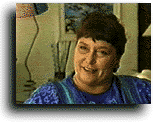Interview Linda Tilton
 Q: Jim Tilton, your husband, went to high school with Newt Gingrich and they were a pair, they were very close friends. How did that come to be?
Q: Jim Tilton, your husband, went to high school with Newt Gingrich and they were a pair, they were very close friends. How did that come to be?Tilton: I don't really know except that both of them seemed to be interested in politics and actually, I think Jim took Newt under his wing. Newt was new and he kind of looked like a nerd and yet Jim immediately realized the potential there and enjoyed Newt. They got along and talked and sort of operated on a higher plane than the rest of their buddies.
Q: He [Jim Tilton] was smart, he was an athlete, he was involved in student politics.
Tilton: Yes. Jim intended to go to West Point. So he knew that he had to build a resume, so to speak. You had to play sports and you had to belong to the Key Club and you had to get good grades and he, like Newt, plans very long-range. That was something else they had in common.
Q: One of the more unusual things about Newt is that he ended up marrying his high school geometry teacher. What do you know about that?
Tilton: All I know is what Jim told me, that they walked into geometry class and Newt said, as soon as Jackie walked in, 'I'm gonna marry her.' And Jim kind of passed it off at the moment. I mean, he didn't always take Newt seriously either. And then Newt did. So they dated secretly and then got married.
Q: Why do you think she married him?
Tilton: Golly. You know, isn't that an interesting question. I don't know. She really did love him. She supported him in every conceivable way that she could and I'm sure she did a lot of things I think she would rather not have done, you know, as far as being nice and going to tea parties and generally spending huge amounts of her time and energy on Newt.
Q: What did Jim make of all this? Here's his good friend who says in class, 'I'm gonna marry the teacher' and then he's dating her and then he does marry her. What did Jim make of all this?
Tilton: Oh, he liked Jackie very much. And this was right in the line of --'You want something, you see it, you work to get it, you plan what you're going to do and you do it.' It was easy. You know? What's to fail?
Q: What about the public and private Newt? Difference? Similarities?
Tilton: I think Newt is sweet and wonderful. He really is a very dear, concerned person. I think that his public persona is one that he needed to adopt and he thought about it before doing it. Had he gone into Congress and been sweet and polite, nobody would ever have heard from him again. But he knew that there were things that needed correcting, in his view anyway. And you had to get attention. And he's very good at getting attention. Jim often tried to get Newt to be less black and white about everything. Less prone to hyperbole and inflammatory language. But it was a tactic that has worked very well for Newt. You can't ignore Newt.
Q: Did Newt surprise you at all?
Tilton: Way back in the 60s, I just thought it was too silly for words. I thought it was these two guys who were just sort of play-acting. Little surprises pop in on you from time to time. And it happened, just like they said it would. Kind of remarkable.
Q: What's one of the more surprising things in your experiences with dealing with Newt?
Tilton: Gosh, the only thing I can think of is when he was managing an apartment while he was going to Emory and Jim was working in Atlanta. Newt always had a push-button phone with a couple of lines coming into his house --and we're talking '63, '64. I mean, it was kind of unheard of. People didn't have children's phones back then.
Newt loved those phones. He reached out and connected with all kinds of people and he loved to say, 'Just a minute, my other line's ringing,' and put you on hold and answer the other one. And because most of his calls were political, sometimes he would confer back and forth. 'Just a minute. Let me ask him about this,' and punch another button. He really did have a wonderful time.
Newt reads. He talks to people. That's another good thing about Newt --he really goes out and asks people questions and honest-to-God thinks about what they say. And I think that's unusual. To a great degree, I've found that his agenda is flexible. I know that people don't believe that. When they listen to him speak, but I really do think he thinks about whether things need to be modified or changed.
Q: He's had some criticism, not just from the far right, but from other conservatives for moderating things from time to time. And he's often just criticized for poppin' off at the mouth.
Tilton: Well, yes. Sometimes Newt gets a little caught up. Actually that was part of Jim's function in the few years before he died. Newt's staff would come and say, 'Jim, you gotta talk to Newt about this or that or the other' or he would tell him to ease off of that or whatever it might be. Because Jim was one of the few people, other than Marianne and a couple others, who could really buttonhole Newt and say, 'You're going way off track here.' So I think Jim served a purpose for Newt.